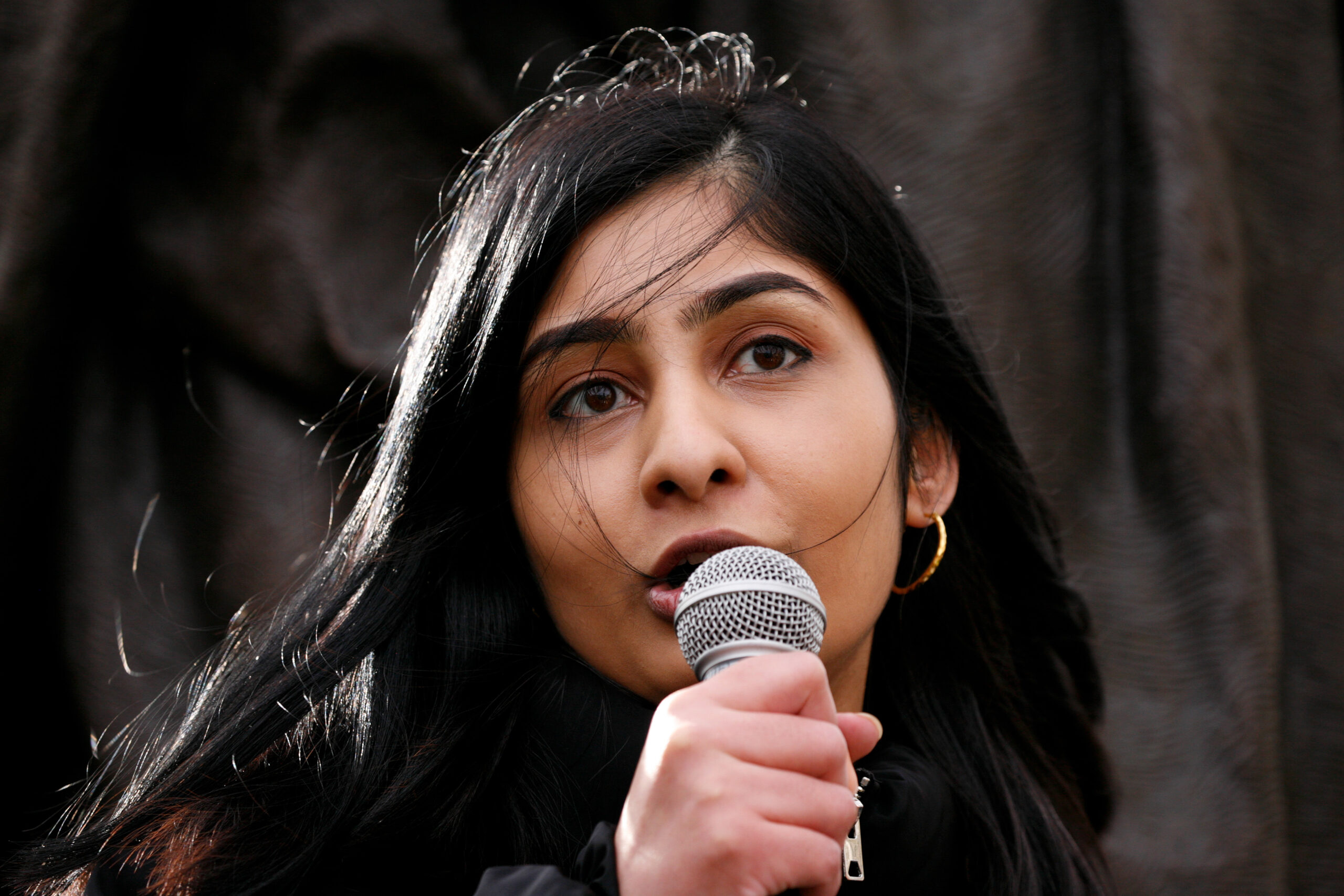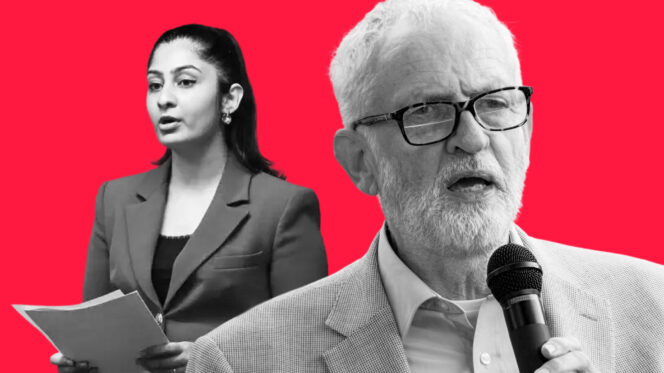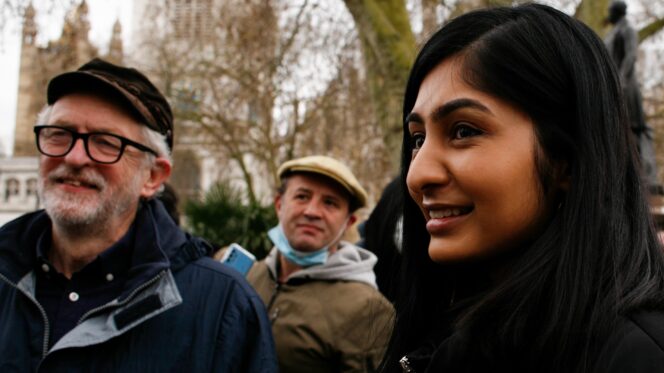
Last week, former Labour MP Zarah Sultana announced she would be seeking to form a new leftwing party with Jeremy Corbyn. 8pm on a Thursday is not the usual moment for such an announcement, but time was of the essence.
The appetite for a new left party is clearly there. A subsequent call from Sultana for supporters to “join Team Zarah” has effectively broken (one very small part) of the internet: the counter on her website is apparently down. A poll seen by the New Statesman a fortnight ago also put a prospective Corbyn-led party polling at 10% of the electorate – not a 400 seat majority, sure, but not something to be sniffed at.
But why launch it now? Well, there are the obvious reasons. Last week was the one-year anniversary of Labour’s loveless landslide. Keir Starmer’s personal approval ratings at an all-time low. The rebellion over the government’s welfare reform bill has unsettled the image of drone-like Labour MPs, all simply doing the leadership’s bidding. And the proscription of Palestine Action, despite its passing through the House of Commons with minimal difficulty, has been widely condemned as a misuse of terrorism law.
There’s also a much wider context. Reform UK, Nigel Farage’s new party, has surged in the polls. A new party launched ahead of the 2029 general election is too long to wait for people who will be a full decade older and, in many cases, less engaged than they were in 2019.
But there was a problem: Sultana’s announcement was met with silence from her supposed co-leader. Corbyn stayed schtum until the following afternoon, and what his much-delayed statement didn’t say was more notable than what it did. There was no confirmation of a new party beyond the fact that “discussions are ongoing”, which we already knew. There was no confirmation that he or Sultana would lead it. Instead, there were vague promises of the kind that we’ve been hearing for a very long time.
What’s going on? How did we get into such a confusing, anticlimactic and – frankly – embarrassing situation in which announcements and non-announcements seem to cancel each other out? And beyond the bickering, what are the points of political disagreement that actually matter?
How did we get here?
Here’s what we know about what got us to this point.
Not long before Sultana published her statement, a meeting took place of around 30 people from various parts of the British left. This was a broad, coalitional group that had, despite its internal differences, been moving slowly towards the formation of a new party. Given the acrimony on the British left since 2019, the mere existence of such a group is something of a feat.
So, who has been involved in the discussions around a new party? Both Corbyn and Sultana, of course, but also many others.
Discussions about the new party have been largely organised by Collective, a group headed by Karie Murphy and Pamela Fitzpatrick which coordinated 18 independent candidates in last year’s election. Murphy and Fitzpatrick are both veterans of Corbyn’s political camp, the former having been executive director of the leader of the opposition’s office, the latter now the director of Corbyn’s Peace & Justice Project.
Then there’s the group founded by Jamie Driscoll, the former North of Tyne mayor. That’s called Majority, and is a local campaign to run candidates in the 2026 Newcastle council elections. Strategically speaking, Driscoll is close to Andrew Feinstein, the former African National Congress MP who challenged Starmer in his constituency last year and is now building the Camden Community Alliance. Both Driscoll and Feinstein want to develop their local campaigns from the ground up.
Then there are the Independent Alliance MPs, who won election in 2024. Their campaigns were largely seen as a show of disgust for Labour’s position on the Gaza genocide, although one of them – Shockat Adam – has been keen to point out that there was much more to his victory than that.
There was, perhaps, good reason for the caution the group forming a new party had shown until recently. For a party to be a mass party, it will need, at the very least, to coordinate between the various parts of the British left. Corbyn is a famously patient coalition builder, unwilling to cut anyone out of the process. And there are certainly substantial disagreements to deal with.
Where are the battlelines?
First, there’s the question of leadership. Sultana’s post implied she will co-lead the new party, but others want Corbyn as the sole figurehead, reasoning that only he has the widespread credibility both on the left and among the wider public. He was, after all, the person who secured almost 13 million votes for the Labour party at the 2017 election. Speaking to me on Novara FM in May, Fitzpatrick was adamant that Corbyn’s leadership was an essential part of the formation of a new party.
One key function of a leader is to act decisively. Corbyn has long been criticised in this department, albeit often being under a pressure that’s difficult for most of us to imagine. Sultana’s announcement, whatever else you think of it, was clearly decisive. Together, their advocates say, they could be a serious force.
Driscoll, for his part, told me “an old-model left party around one individual” didn’t interest him. “I want to see lots of ground-up campaigns working together and winning in 2026,” he explained. “New leaders will emerge. Then have a founding conference and elect a new generation of leaders – plural – who can take us into the 2029 general election and convince the public they could run the country.”
Parliamentary politics also involves fighting the media war – the battle for attention and ideas – which any new party will have to contend with. Although we live in an age of decentralised media, it’s still necessary to have a group of strong and reliable media performers to go on TV and radio and put forward the party’s message. Adam, also speaking on Novara FM, argued that if the point is to offer something new to the electorate, it can’t come entirely in the shape of Corbyn, one of the best-known politicians in the country. Perhaps no one is more widely trusted on the left – but for the public at large, no one comes with more baggage.
Then there’s the question of democracy. Everyone agrees that the new party should be democratic. But democracy can mean many things.
Certainly, the idea of democracy as being just about elections is an impoverished one. Many of the people I spoke to said that the new party should not only be democratic by holding elections for leaders, but also in its form, striving to represent as fully as possible its constituencies.
Something like a democratic infrastructure is emerging within Collective. Some of the candidates that the group backed in 2024 have set up new local parties since then. Sean Halsall, of Southport Community Independents, told me that members of his group “have the structures in place” and have “ingrained ourselves in our community”. But Halsall also told me he thought they needed a national party to provide “a recognised brand and infrastructure,” and that his and the other local parties are bound by Collective’s constitution to fold into a new national left party when it emerges.
This echoes the mode of democracy proposed by James Schneider, Corbyn’s former director of strategic communications and another important player in the discussions around the new party. In discussion with Green leadership candidate Zack Polanski on Novara FM in February, Schneider argued that a new party should be at once bottom-up and top-down – a vision not, in fact, dissimilar from Polanski’s own hopes for an eco-socialist Green party.
From the bottom-up, Schneider’s strategy is about tying together the parts of society through which we can exert social power. What are those parts? Unions, naturally (although when I asked if any of them would jump ship to a new party, I got an understandably swift round of “no comment”). But Schneider’s vision is broader: “We’re talking libraries, we’re talking working men’s clubs. We’re talking bands, football teams, all of this stuff – the rich tapestry of life that is social power, which could then have political power on top of it.” For him, the new party could be an articulation of this power from below, a coalition of working class communities, asset-poor, downwardly mobile graduates, and racialised people.
Others argue that more radical forms of democracy are available. Driscoll has pushed for local campaigns to pursue people’s assemblies, whereby regular people are invited to collectively write policy. These people get advice from experts, and are often paid for their time, and then the party infrastructure is tasked with implementing what they choose. Majority has been using assemblies to source its policies, and while the party’s political values are explicitly anti-racist and pro-public ownership, it also uses the language of participatory democracy, which Driscoll says is more likely to cut through with the public than leftwing tubthumping.
Collective hopes.
If the past week has proved anything, it’s that the British left is brimming not just with energy and ideas, but impatience. This looks at one level like chaos and infighting, but it’s precisely the raw material out of which new movements are forged. The challenge now is to turn overlapping hopes into a shared project that is bigger than any one organisation, personality or tactic.
Corbyn, Sultana, community independents and eco-socialist Greens all speak to constituencies others can’t. Instead of asking which single vision will prevail, and who will lead it, the more useful, practical question is to ask how they can work together, whether that be through co-endorsed local candidates, joint campaigning infrastructure, an agreed minimum programme on climate, wages and public ownership, and a clear protocol for resolving disputes before they become headlines.
A new party with the organisation, breadth and moral imagination to meet the moment is within our collective grasp. Creating it will mean overcoming the inane factionalism that has too often plagued the British left. But this is what’s owed to millions of people who have already waited too long for politics that is finally on their side.
Richard Hames is an audio producer at Novara Media.


